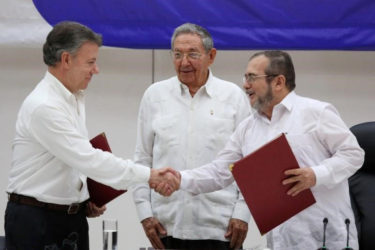HAVANA/BOGOTA, (Reuters) – Colombia’s government and leftist FARC rebels signed a historic ceasefire deal yesterday that brought them tantalizingly close to ending the longest running conflict in the Americas.
The accord, capping three years of peace talks in Cuba, sparked celebrations and tears of happiness among some in the Colombian capital. It sets the stage for a final deal to end a guerrilla war born in the 1960s out of frustration with deep socio-economic inequalities that outlived all other major uprisings in Latin America.
“May this be the last day of the war,” said bearded FARC commander Rodrigo Londono, better known by the nom de guerre Timochenko, his voice choked, after shaking hands with Colombian President Juan Manuel Santos at a ceremony in Havana.
Santos, 64, is half-way through his second term and has staked his legacy on peace in the face of opposition from sectors of the country who think the FARC should be crushed militarily.

“This means nothing more and nothing less than the end of the FARC as an armed group,” Santos said, adding that the final peace deal would be signed in Colombia. “The children and youth of our country have never known a single day without the violence of the conflict. Neither have the adults.”
In Colombia, even before Santos spoke, church bells pealed at noon to mark the start of the signing. Crowds in Bogota, the capital, gathered around giant TV screens set up in the streets, dancing, cheering and clapping as the ceremony unfolded.
One placard read, “we’ve finished the war, now let’s build peace.”
About 1,000 people gathered in the Plaza Bolivar, the city’s main square, to celebrate despite rain. Some waved flags and balloons, others hugged and wiped their eyes.
“I’m 76 and have lived this war all my life – I never thought the time would come when these characters would sign peace. I’m so happy – I can die in peace,” said Graciela Pataquiva, a retired teacher, crying as she spoke.
Santos’ government says a final deal, which he said will be ready by July 20, would add one percentage point annually to economic growth in Colombia, which over the past two decades has turned itself around from a failing state to an emerging market darling.
Thursday’s agreement went further than many had hoped, with the FARC committing to putting a final accord to the Colombian people in a plebiscite, a promise made by Santos that had been a key sticking point.
Not everybody supports the peace process, and Santos will have to work hard to convince opponents to back it in a referendum.
Former President Alvaro Uribe, the leading critic of the talks, said the agreement was “a surrender to terrorism” by Santos.
Under the agreement read out by mediators Norway and Cuba, the rebels will lay down their arms within 180 days of a final accord and demobilize into 23 temporary zones and eight camps. The ceasefire will only kick in when the final deal is agreed, although the two sides effectively stopped attacks almost a year ago and violence is already at historic lows.




